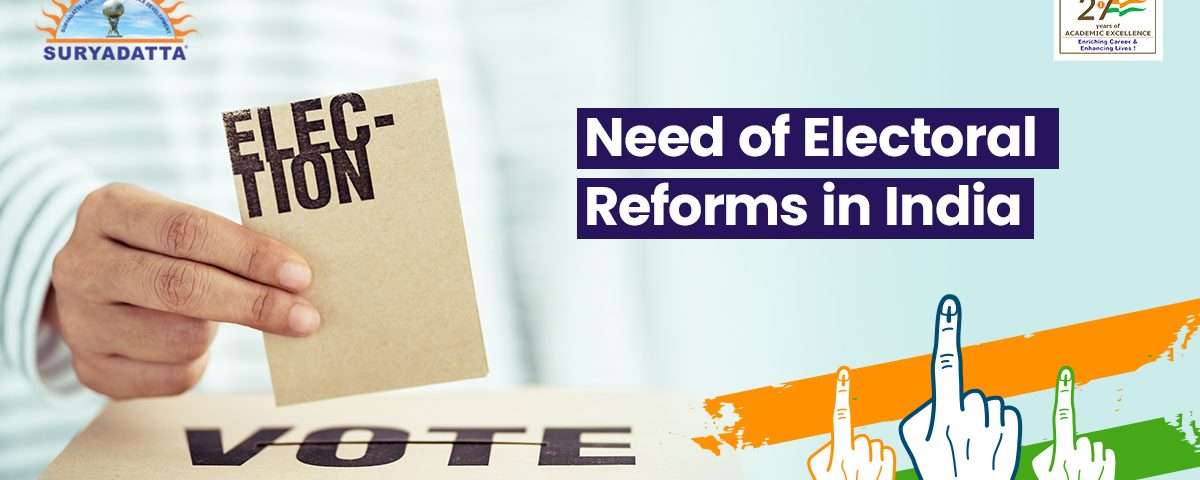Need of Electoral Reforms in India – Mr. Vijayadeep Munjunkar

Uniform Civil Code- Mr. Vijaydeep Munjunkar
April 27, 2025
Panchayati Raj System in India: A Comprehensive Guide
April 27, 2025Electoral reforms play a vital role in shaping and strengthening the democratic framework of any country. In India, democracy is not just a form of governance but a way of life, a means to provide equality, justice, and liberty. However, the functioning of India’s electoral system has faced criticism over the years for its inefficiencies and challenges. This blog explores the pressing need for electoral reforms in India, highlighting key issues and suggesting actionable changes to enhance transparency, accountability, and trust in the electoral process.
Understanding the Essence of Electoral Reforms
The term “electoral reforms” encompasses systematic changes made to improve election processes, laws, and institutions to ensure free, fair, and transparent elections. India’s electoral system, while robust, is not immune to challenges such as political corruption, voter manipulation, misuse of money power, and criminalization of politics. Reforming the electoral process is imperative to uphold the sanctity of democracy and ensure equitable representation for all citizens.
Challenges in India’s Electoral System
1. Money Power in Elections
One of the most significant challenges in Indian elections is the excessive use of money. Candidates and political parties often spend beyond permissible limits, resorting to unethical practices like vote-buying, distributing freebies, and organizing extravagant campaigns. This undermines the principles of a level playing field and transparency.
2. Criminalization of Politics
A growing concern in Indian politics is the increasing number of candidates with criminal records contesting elections. Data from various reports highlight that a significant percentage of elected representatives face serious criminal charges, which erodes public trust in the system.
3. Voter Apathy and Low Turnout
Despite being the largest democracy in the world, India struggles with voter turnout, especially among urban and educated voters. This apathy can lead to an unrepresentative government and weakened democratic participation.
4. Erosion of Ethical Standards
The use of divisive tactics, hate speech, and propaganda during campaigns compromises the ethical foundations of democracy. Political parties often resort to polarizing strategies to win votes, undermining national unity.
5. Lack of Internal Democracy in Political Parties
Most Indian political parties operate in a highly centralized manner, with limited internal democracy. This restricts fresh talent and voices from emerging, leading to stagnation and dynastic politics.
The Need for Electoral Reforms
Reforming India’s electoral system is critical for several reasons:
- Enhancing Transparency: Reforms can reduce malpractices like vote-buying and illicit funding, making elections more transparent.
- Strengthening Democracy: By ensuring fair representation and reducing voter apathy, reforms can reinforce the democratic process.
- Fostering Accountability: Reforms can establish mechanisms to hold candidates and political parties accountable for their actions and promises.
- Building Public Trust: A reformed and transparent electoral system can restore faith among citizens in the democratic process.
Proposed Electoral Reforms for India
1. State Funding of Elections
Introducing state funding for elections can curb the influence of money power. By providing candidates with financial support, it ensures a level playing field and reduces dependency on private donations.
2. Decriminalization of Politics
Amendments to existing laws are required to bar individuals with serious criminal charges from contesting elections. Expedited judicial proceedings in cases involving politicians can prevent misuse of the system.
3. Compulsory Voting
To address voter apathy, India could consider making voting mandatory. Coupled with awareness campaigns, this could encourage higher voter participation.
4. Digital Voting Systems
The adoption of secure, technologically advanced e-voting systems can make the process more accessible, especially for urban and tech-savvy voters. However, this must be done with stringent cybersecurity measures.
5. Regulation of Political Funding
Mandatory disclosure of party funding and expenditure should be strictly enforced. Donations above a certain threshold should be made public to ensure transparency.
6. Proportional Representation
Introducing elements of proportional representation in the electoral system can ensure fair representation for smaller parties and communities.
7. Strengthening the Election Commission
Empowering the Election Commission of India (ECI) with more autonomy and resources can enhance its ability to conduct free and fair elections. Measures like appointing independent observers and penalizing malpractices are crucial.
8. Debates and Manifesto Accountability
Introducing mandatory public debates between candidates can help voters make informed choices. Parties should also be held accountable for implementing their election manifestos.
The Role of Educational Institutions in Promoting Electoral Awareness
Educational institutions play a pivotal role in fostering civic responsibility and awareness among students, who are future voters. Law colleges, in particular, have a significant part to play in shaping the next generation of legal experts and informed citizens.
Suryadatta Law College (SLC) in Pune is a shining example of an institution committed to nurturing students with exceptional legal acumen and ethical values. Established under the aegis of the Suryadatta Education Foundation in 2022, SLC aims to empower students to bring meaningful changes to society, including advocating for electoral reforms.
SLC offers a 5-year B.A. LL.B. program, providing students with comprehensive knowledge of legal frameworks, including constitutional law and electoral processes. Affiliated with Savitribai Phule Pune University and approved by the Bar Council of India, SLC equips aspiring lawyers to address pressing issues like electoral reforms through their expertise and commitment to justice.
Conclusion: A Collective Responsibility
The need for electoral reforms in India is urgent and undeniable. As citizens, policymakers, and future legal professionals, we all share the responsibility of ensuring the integrity of the democratic process. By addressing systemic flaws, adopting technological advancements, and fostering greater accountability, India can set a global benchmark in democratic governance.
For aspiring law students passionate about making a difference, Suryadatta Law College (SLC) provides the perfect platform to gain the knowledge and skills needed to advocate for reform and justice. Enroll today and take the first step towards shaping a brighter, more equitable future for India’s democracy.


